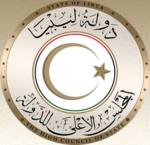| High Council of State المجلس الأعلى للدولة | |
|---|---|
 | |
| History | |
| Founded | 5 April 2016 (2016-04-05) |
| Preceded by | General National Congress |
| Leadership | |
| Chairman | Mohammed Takala |
| First Deputy Chairman | Massoud Abid |
| Second Deputy Chairman | Omar Obaide |
| Structure | |
| Seats | 145 |
 | |
| Political groups | Members of the GNC appointed after 2014 (134) Members of the GNC elected in 2012 (11) |
| Meeting place | |
 | |
| Radisson Blu Al Mahary Hotel Tripoli, Libya | |
| Politics of Libya |
|---|
 |
|
|
| Constitution |
Executive
|
Legislature
|
Judiciary
|
| Administrative divisions |
| Elections |
Foreign relations
|
|
|
The High Council of State (Arabic: المجلس الأعلى للدولة, al majlis al'aelaa lildawla) is an advisory body for Libya formed under the terms of the Libyan Political Agreement which was signed on 17 December 2015. The agreement resulted from United Nations supported peace talks and has been unanimously endorsed by the Security Council. The High Council of State is able to advise the interim Government of National Accord (GNA) and the House of Representatives (HoR), currently based in Tobruk, and can express a binding opinion on these bodies under certain circumstances. The members of the council were nominated by remaining members of the General National Congress who in 2014 were not elected to the HoR.
History
The council met for the first time on 27 February 2016 and it was formally established at a ceremony at the Radisson Blu Al Mahary Hotel in Tripoli on 5 April 2016.
The council moved into the headquarters of the former General National Congress, at the Rixos Al Nasr Convention Centre, on 22 April 2016.
On 31 August 2016, a 94-member rival High Council of State was proclaimed in Benghazi and its members wanted to join the official body.
On 21 September 2016, the High Council of State took legislative powers.
On 10 October 2016, the Rixos Al Nasr Convention Centre was attacked by gunmen loyal to the GNC. On 15 October 2016, forces loyal to the GNC took over the building and announced the return of the Ghawil cabinet. Then, fighting occurred between Sarraj loyalists and Ghawil forces. Following these clashes, the council once again took up residence in the Radisson Blu Al Mahary Hotel.
Chairman of the High Council
| Incumbent | Since | Until | Party |
|---|---|---|---|
| Abdulrahman Sewehli | 6 April 2016 | 8 April 2018 | Union for Homeland |
| Khalid al-Mishri | 8 April 2018 | 6 August 2023 | Justice and Construction Party |
| Mohammed Takala | 6 August 2023 | Independent |
Saleh al-Makhzoum served as the first deputy chairman and Muhammed Imazzeb served as second deputy chairman under Sewehli. They were replaced by Naji Mukhtar and Fawzi Aqab, respectively, during the tenure of al-Mishri.
In August 2023, Mohammed Takala replaced al-Mishri.
See also
References
- "As Libya marks 64th independence anniversary, UN envoy urges unity behind new Government". UN News. 24 December 2015. Retrieved 8 April 2019.
- "Unanimously Adopting Resolution 2259 (2015), Security Council Welcomes Signing of Libyan Political Agreement on New Government for Strife-Torn Country | Meetings Coverage and Press Releases". Archived from the original on 2016-01-30. Retrieved 2016-06-21.
- "Libyan deal on course, but who is on board?". english.alarabiya.net. 25 December 2015. Retrieved 8 April 2019.
- "Op-Ed: State Council of Libyan Government of National Accord meets". www.digitaljournal.com. 27 February 2016. Retrieved 8 April 2019.
- "GNC members announce its "dissolution" and creation of the State Council". Libya Herald. 2016-04-05. Retrieved 2016-04-05.
- "State Supreme Council takes over the GNC headquarters". 22 April 2016. Retrieved 8 April 2019.
- "Al-Sweihli sends three High Council of State members to investigation - The Libya Observer". 22 July 2017.
- "State Council to assume legislative power, condemns takeover of oil ports - The Libya Observer". www.libyaobserver.ly. 22 July 2017. Retrieved 8 April 2019.
- "High Council of State evacuated over rift with its security guards - Libyan Express". 10 October 2016.
- "GNC retakes parliament compound, High Council of State condemns - The Libya Observer". www.libyaobserver.ly. Retrieved 8 April 2019.
- "Rival group seizes Libya's UN-backed government offices". Archived from the original on 2016-10-22. Retrieved 2016-10-16.
- "Clashes erupt in Libyan capital Tripoli - Region - World - Ahram Online". english.ahram.org.eg. Retrieved 8 April 2019.
- The Washington Post
- "State Supreme Council elects Al-Sweihli as President". Libyan Express. 2016-04-06. Retrieved 2016-04-06.
- "Al-Makhzoum: PC will announce leadership of Libyan army soon". Libyan Express. 2016-04-06. Retrieved 2016-04-06.
- "Al-Sweihli calls on Tobruk Parliament to speed up implementation of Skhirat agreement". 7 April 2016. Retrieved 8 April 2019.
- "Khalid Al-Mishri elected to replace Al-Swahili as Head of Libya High Council of State". Libya Observer. 8 April 2018. Retrieved 21 April 2019.
- "Libya's High State Council elects new leader as political gridlock deepens". Al Jazeera. 6 August 2023.
External links
- High Council of State - Official Facebook feed (Arabic)
- High Council of State - Official Facebook feed (English)
| Libyan institutional transition | |||||
|---|---|---|---|---|---|
| Military context | |||||
| Head of state |
| ||||
| Advisory body |
| ||||
| Governments |
| ||||
| Parliaments |
| ||||
| Constitution | |||||
| Elections in Libya | |||||
| Judiciary | |||||
| Military |
| ||||
| Peace process | |||||
| Support | |||||
| Libya | |||
|---|---|---|---|
| History |  | ||
| Geography | |||
| Politics | |||
| Economy | |||
| Culture | |||